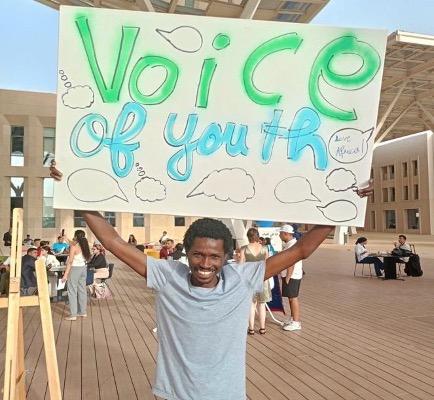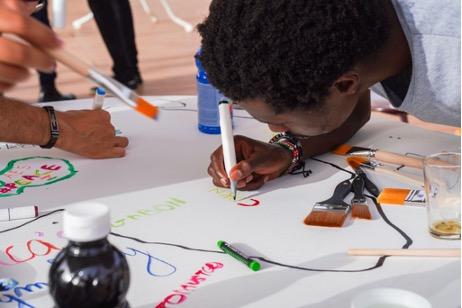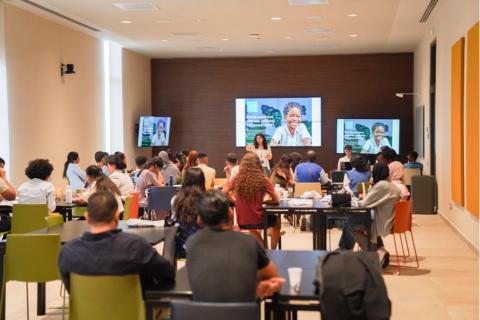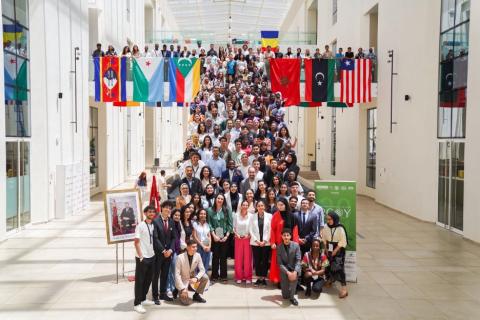Not Without Us! Youth Leading the Charge: Reflections from RCOY Africa
Not Without Us! Youth Leading the Charge: Reflections from RCOY Africa
“We need innovative ideas to combat climate change. Therefore, it is more than necessary to let young people play an active role in the fight” - Cyrille Traore, African Youth Initiative on Climate Change (AYICC's) 2024/2026 Capacity Development Coordinator and Africa Youth Mobilization for COP (AYM4COP) Contact Point.
Africa, the world's youngest continent, boasts a staggering 70% of its population under the age of 30. According to the Population Reference Bureau, by 2030, young Africans will represent 42% of the world’s youth, with 75% of those under 35 living in Africa. This immense young population presents an extraordinary opportunity for global growth and resilience, especially in the context of climate change. African youth, deeply impacted by climate change, also possess vast potential for driving climate resilience.
Despite contributing minimally to global emissions, Africa's youth bear the severe consequences of climate change. This reality has placed them at the forefront of global climate action. Their visibility in this fight has been hard-won through years of grassroots activism and efforts to influence high-level climate policymaking. Initiatives like the Regional Conference of Youth (RCOY), starting in South Africa and extending to Morocco, and the African Youth Initiative on Climate Assembly (AYICA), have empowered young climate activists to raise their voice and have their demands met by those in power. These platforms have been crucial in advocating for an equitable and climate-resilient future.
The recent RCOY Africa conference was a powerful testament to young African activists' passion, commitment, and resilience. Over 210 young leaders from 40 countries came together, driven by a shared determination to confront the climate crisis. Many made significant personal sacrifices, such as forfeiting personal commitments and taking loans, to ensure their voices were heard at these gatherings. CDKN’s Africa Regional Coordinator, Stanley Mburu, attended and shares his key takeaways from the conference.
1. Importance of promoting Gender Equity and Social Inclusion
A significant takeaway from the conference was the focus on gender inequalities exacerbated by climate change. Discussions underscored how women and girls, especially in Africa, suffer disproportionately due to systemic inequities. The Youth Statement developed after three days of intense discussion proposed gender-neutral policies to promote gender equity and social inclusion (GESI) to combat these climate-induced inequalities. Women and marginalised groups must have equal opportunities and resources to build resilience against climate impacts and community-led adaptation strategies incorporating indigenous knowledge are also crucial.

2. Fresh perspectives and innovative solutions across scale
Youth participation is vital for infusing fresh perspectives and innovative solutions into climate strategies. Collaboration among local communities, government agencies, and international bodies is necessary to achieve sustainable climate adaptation and resilience. The role of youth in climate action is not limited to the community level; it extends to influencing policy-making spaces. For instance, at RCOY, there were many young people who are not only well-versed in negotiation processes but also understand their communities' needs and are prepared to advocate for those needs in discussions with funders and governments. This enables youth to amplify their voices, shape the direction of global climate action, and advocate for action for their community and region at large.

Conferences like RCOY are essential platforms for young people to collectively shape their agenda and express their vision. Although RCOY Africa 2024 has concluded, the momentum it generated is just beginning. The ideas and proposed ideas will be shared at future events including New York Climate Week and at COP29’s Conference of the Youth in Baku in November. The connections made, ideas shared, and solutions developed at this conference are the seeds of a movement that will grow in strength and influence.

3. RCOY Africa's Role in shaping CDKN's regional youth engagement
Participating in this year’s Regional Conference of Youth (RCOY) has highlighted the ability of young people to self-organise, mobilise, and take leadership in tackling regional challenges. To further amplify youth agency, there is a need for more foras dedicated to empowerment, capacity strengthening and movement-building for youth champions.
CDKN’s involvement in RCOY has been instrumental in aligning our regional youth efforts with youth-driven ideas and priorities, particularly as it will build upon ongoing work through the Knowledge into Action (K2A) initiatives and key country programmes in Ghana, Ethiopia, Senegal, Namibia, and Kenya.
A key action is to begin integrating the youth statement - developed by young participants - into CDKN’s ongoing work. This will ensure that their call to action is heard and being taken into action by civil society. In addition, one of the major outcomes of this year’s RCOY was an enhanced focus on promoting Gender Equity and Social Inclusion (GESI) in climate adaptation, which remains central to CDKN’s border work.
“As young Africans, we are not just participants in the climate action movement—we are leaders. The time to act is now, and together, we will create the Africa we envision—an Africa where youth are the driving force behind resilience and sustainability.” - Stanley Mburu, CDKN Africa Regional Coordinator and Youth Co-Lead

